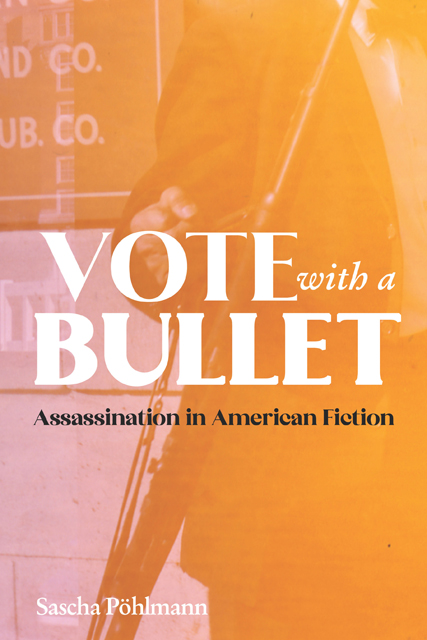Book contents
- Frontmatter
- Dedication
- Contents
- Introduction: The Individual and Society
- 1 The Princess Casamassima (1886)
- 2 The Assassination Bureau, Ltd. (1910/63)
- 3 All the King’s Men (1946)
- 4 Solar Lottery (1955)
- 5 The Manchurian Candidate (1959)
- 6 The Parallax View (1970)
- 7 Libra (1988)
- 8 The Dead Zone (1979)
- 9 11/22/63 (2011)
- 10 Big If (2002)
- 11 Checkpoint (2004)
- 12 The Good Father (2012)
- Conclusion
- Works Cited
- Index
8 - The Dead Zone (1979)
Published online by Cambridge University Press: 14 January 2023
- Frontmatter
- Dedication
- Contents
- Introduction: The Individual and Society
- 1 The Princess Casamassima (1886)
- 2 The Assassination Bureau, Ltd. (1910/63)
- 3 All the King’s Men (1946)
- 4 Solar Lottery (1955)
- 5 The Manchurian Candidate (1959)
- 6 The Parallax View (1970)
- 7 Libra (1988)
- 8 The Dead Zone (1979)
- 9 11/22/63 (2011)
- 10 Big If (2002)
- 11 Checkpoint (2004)
- 12 The Good Father (2012)
- Conclusion
- Works Cited
- Index
Summary
The novels at the center of the following two chapters are closely related to the concept of panic, although their author trades more precisely in fear. These are The Dead Zone (1979) and 11/22/63 (2011) by Stephen King. The pair could be considered his “assassination novels,” and the latter in many respects picks up on what the former did more than three decades earlier. Both address the notion of agency panic through individuals who, as protagonists or narrators, are not as ontologically unstable as Oswald in Libra, but who struggle with moral, epistemological, and cognitive doubts that also work to undermine their individuality as the basis of their actions. Both novels are rooted in King’s trademark genre of horror fiction, but they do not simply use an utter lack of agency to produce the effects of fear and terror in the reader—in this regard, The Manchurian Candidate and its mindless zombie of a protagonist is much more of a horror novel than either The Dead Zone or 11/22/63. Instead, King’s novels continue and expand the gothic tradition of Romanticism in which individuals are confronted with the irrational, the unspeakable, the supernatural, and the limits of their own rationality, reason, and morality.
The Dead Zone, especially, is a perfect example of the fictional assassin’s agency panic in the framework of the individual conscience in conflict with social conventions. Using a third-person omniscient narrator, the novel both presents a strong individual protagonist to readers while at the same time subverting the cognitive, epistemological, and ontological framework from which that protagonist derives his agency, willpower, and convictions. Readers are to follow him closely in his transformation from a citizen who is so normal he is actually called John Smith to an assassin, empathizing and identifying with him all the way, being invited to think of him as “Johnny.” I am convinced that The Dead Zone succeeds like no other text in American fiction in portraying this development and making the reader complicit in it, yet the novel also effectively transports the doubt that haunts its protagonist to the reader and makes it an irreducible aspect of its narrative. Tony Magistrale describes John Smith as one of King’s rather typical characters who “are all fiercely independent people, in possession of intrinsic and uncomplicated moral codes that remain consistent in the face of societal challenges” (“Regionalism” 82).
- Type
- Chapter
- Information
- Vote with a BulletAssassination in American Fiction, pp. 113 - 126Publisher: Boydell & BrewerPrint publication year: 2021

